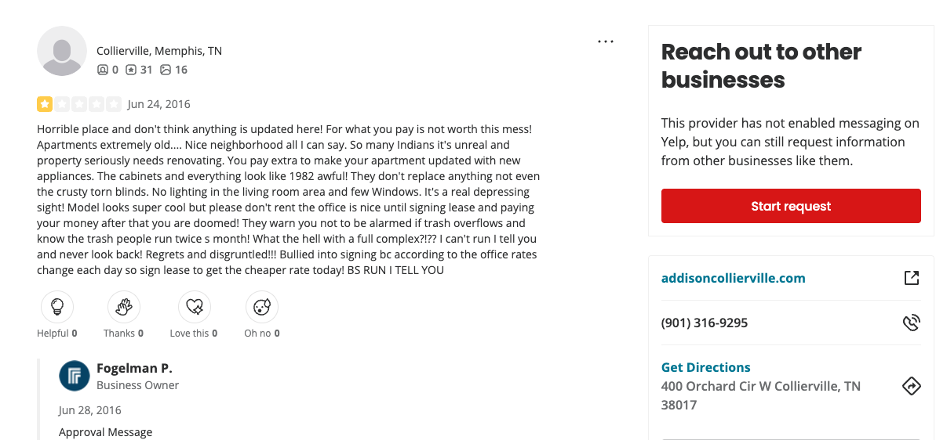FedEx-case example of how to erase a nice community and turn it into a shite hole
The jewbie method of erasing a well functioning company and destroying a wholesome christian community at the same time. Fedex software no longer works,scheduling pickups is a thing of the past,and no one can barely speak English. White families go bankrupt, divorce, move out and H1B families move in and demand the churches be demolished for a new Temple for some elephant headed Babel Chimera from the days of Nimrod.
Ongoing successful jewbie operation with government support.
Great ‘Overnight’ Replacement: The (Federal) Express Decline and Fall of Collierville, TN
Guest Post by Karl Hollywood
For two generations, Bob’s family didn’t just work for FedEx; they were a part of the Collierville community that the company built. His father, a Collierville native, retired as a respected FedEx pilot. Bob followed him into the company, securing a white-collar technical role and the promise of the same stable, prosperous life in the town Parade magazine once named “Best Main Street” in America.
He remembers a different Collierville. A town of just over 10,000, where kids left their bikes unlocked outside the gas station and a trip to the store always meant running into someone you knew. “It was the type of community where… you could leave your bike unattended and not worry about it being stolen,” he recalls.
That sense of security was built by FedEx. The company was the town’s bedrock. “If you wanted to live a nice, comfortable life in Collierville, your best bet was working for FedEx,” Bob says. A job there meant everything. It paid for new houses as the town grew, supported local businesses, and offered an almost unheard-of promise in modern America: lifelong job security. “The company was loyal to its employees, and they in turn were loyal to the company. Its reputation was otherworldly.”
But today, Bob watches with a growing sense of distress as the forests and fields he played in are clear-cut to make way for massive, multi-family apartment complexes. His unease solidified into alarm when a friend who teaches at a local elementary school mentioned a startling statistic: nearly 80% of her students were now minorities, with half of the student body being of Indian descent and requiring ESL services. The town he planned to raise his own children in is rapidly becoming unrecognizable.

The story of Collierville’s transformation is inextricably linked to the upheaval within its largest employer. Since founder Fred Smith, a local legend, handed the reins to new CEO Raj Subramaniam, a seismic shift has rattled FedEx to its core. This article investigates the charge, leveled by current and former employees, that a new corporate strategy, one that funnels exclusive contracts to a network of Indian-run consulting firms, is dismantling the company’s celebrated “People First” culture and systematically reshaping its hometown, leaving long-time residents feeling like strangers in their own land. This despite Collierville being a deep red MAGA town that recently put on an extremely well-attended memorial service for Charlie Kirk, with GOP representation at both the state and federal congressional and executive levels of government.
The Old Guard and the New
For nearly half a century, FedEx operated as an extension of its founder. Fred Smith, a visionary CEO, built a global empire on a philosophy of growth and infrastructure. His priorities were market expansion and acquisitions, not aggressive cost-cutting. Under Smith, IT investments were geared toward supporting a vast logistics network, pioneering innovations like package tracking. The culture was one of fierce loyalty. Mass layoffs were unthinkable, even during the 2008 recession. In Memphis, FedEx was more than a company; it was a stable, lifelong career path that built the surrounding communities.
That foundation began to crack just as Smith stepped down in June 2022. His successor, Raj Subramaniam, inherited a different world. A post-COVID slowdown in e-commerce, coupled with rising inflation, saw package volumes decline. Competitors like UPS and a rapidly expanding Amazon Logistics were leaner and more efficient. As FedEx’s stock tumbled 20% in a single day in September 2022, a new and powerful force made its move. The activist hedge fund D.E. Shaw, a significant shareholder, formalized a cooperation agreement with the company.
With D.E. Shaw’s backing, Subramaniam was given the mandate to do what Smith never would: radically restructure the company from the ground up.
The primary vehicle for this transformation is the DRIVE program, a sweeping initiative launched in 2023 with the explicit goal of cutting $4 billion in permanent costs. At its core, DRIVE is an IT-led overhaul designed to integrate FedEx’s historically separate Express and Ground networks, a move Smith had long resisted. To execute this vision, FedEx turned to outside consultants. McKinsey & Co. was brought in to engineer the cost-cutting and restructuring strategy. Accenture was handed the keys to the company’s “digital transformation.”
For long-time employees, this shift was immediate and brutal. FedEx terminated long-standing contracts with IT vendors like Wipro, HCL, and Mphasis, consolidating the work under Accenture. Insiders point to the FedEx Dataworks division as a case study of the new corporate environment. The division’s leader, whose wife was an executive at Accenture, allegedly steered the exclusive contract to the firm before being “fired” with a $3.3 million exit package amid allegations of cooking the books. He was promptly replaced by the very Accenture project lead who had been overseeing the FedEx account.
Initial reports referring to the allegations of financial malfeasance have since been scrubbed (e.g., the New York Post), though you can still see the original headline in the URL and original reporting in archived versions of the articles. Instead of facing the law, he received a $3.3 million payout, and the company continues the bad behavior apace.
Additionally, FedEx DataWorks generates an estimated $10 million in revenue with an estimated 600-employee workforce. At $17,000 of revenue per employee getting paid out some multiple of that, this must be a bear for the business. Furthermore, a new initiative with this little revenue does not typically get staffed at such a monumental level.
These “cost savings” have come at a steep human price. The IT-driven consolidation has led to the closure of nearly 100 facilities across the United States and the elimination of thousands of jobs. Memphis has been hit the hardest, with 1,200 to 1,300 layoffs announced in 2025 alone. “Since Raj took over, we’ve had layoffs each year and no growth. Most managers aren’t allowed to backfill positions if someone leaves, whether they move to a different department within the company or outside the company. Promotions have stalled. Healthcare has gotten worse and more expensive,” Bob adds.
At the same time, FedEx filed for almost 200 H-1B visas between just 2022 (average salary: $125,000) and 2024 (average salary: $143,000), all of which were certified. As of writing this, I found 64 open roles on a guest visa job board for FedEx Dataworks, despite a screenshot from a current employee showing me only 3 roles listed on the company intranet. Some of these contractors subcontract under each other in difficult-to-parse relationships. Two of the contractors that subcontract to Mphasis for FedEx Services share the exact same website and phone number, with the only difference being the company name and logo. These companies must be investigated by the DOL, USCIS, and other relevant agencies.

These sites are full of AI-generated boilerplate, meaningless word salad, bad design, and plenty of bugs, calling into question the actual value that they could possibly bring to a major multinational company business.
The new leadership insists these changes are necessary for long-term health, but the degradation in service and morale is palpable. In a major blow to its core business, FedEx lost its massive domestic air cargo contract with the U.S. Postal Service in April 2024. On September 29th, 2025, a stunning vote of no confidence in Raj was delivered by over 5,000 FedEx pilots. For many who built their lives around the company, the evidence is clear: the focus is no longer on building an American institution but on siphoning value from it as quickly as possible.
On Cost Savings
Across the corporate landscape, a growing chorus of insiders argues that the promised cost savings from outsourcing are a dangerous illusion. What starts as a strategy to reduce labor costs, they contend, often spirals into a cycle of inefficiency, product degradation, and financial mismanagement that benefits only a select few and actively harms the company.
At the heart of the issue is a fundamental miscalculation. The strategy frequently involves replacing small, highly skilled domestic teams with large, inexpensive offshore teams. An insider with firsthand experience claims this math never adds up. “Hiring 60 people who can’t do the job is vastly inferior to two people who can,” they stated. This approach leads not to savings but to massive cost overruns as unqualified hires, sometimes with fraudulent resumes, require constant management and produce subpar work. The projects they manage are plagued by delays, bugs, and production incidents, erasing any initial savings on wages as laid out in the original bid. As more of the team gets hollowed out, we see more production incidents, bugs, quality issues, et cetera. As the load increases, the people who can shoulder it burn out and churn, exacerbating the problem. Outsourcing and mass import of H-1B frauds put a company into a death spiral. Products and services never improve once this process starts. It isn’t cost cutting. It makes you leaner the way cancer makes you leaner, because that’s what it is. I’ve seen this firsthand and quit multiple lucrative gigs because of this.
This decline in workforce quality has a direct and predictable impact on customers. As products and services are maintained by inexperienced teams, companies see a sharp increase in system outages, security flaws, and general unreliability. The result is a frustrated customer base and rising churn rates, which directly damage a company’s revenue and reputation. The very initiatives intended to boost the bottom line end up undermining it.
Critics argue this phenomenon does not result from a simple miscalculation but is a feature of modern executive incentives. These outsourcing deals are often driven by short-term metrics that trigger executive bonuses, effectively allowing leaders to siphon value from a company before the long-term consequences become apparent. This focus on immediate personal gain comes at the expense of sustainable growth, product innovation, and the overall health of the organization.
Perhaps most troubling is the lack of accountability. When these initiatives inevitably fail, the executives responsible often depart with multi-million-dollar severance packages. They face no lasting consequences for the damage inflicted, leaving them free to repeat the same value-destroying strategy at the next corporation. This creates a perverse system where leaders can profit from failure, while shareholders, employees, and customers are left to pay the price.
Hollowed Out: The View From the Inside
The internal crisis at FedEx is perhaps most visible from 30,000 feet. The pilots, long considered the elite backbone of the company’s global logistics network, are in open revolt. “Every single FedEx pilot I know is looking into alternative employment,” one source close to the pilots’ union revealed. “Every. Single. One. I cannot even begin to tell you how momentously bad that is in the context of airline pilots.”
This sentiment is not confined to the cockpit. Across the company, from package handlers to corporate veterans, the feeling is one of profound decay. “I was hired in a couple years before Fred Smith handed over the reins to Subramaniam,” wrote one employee on X. “I’ve watched everything change and go rapidly downhill at the facility I work out of.”
Even middle managers feel a loss of control and purpose. “He’s been telling me it’s not the same company he started working for, and it’s only going to get worse,” one person shared about a friend in FedEx management. “He sees them ultimately failing if it stays this way. He’s not even allowed to interview package handlers; they’re hired by AI.”
A former 10-year corporate employee described a systematic replacement of the American workforce. “Internal support and IT staff were 100% American back in 2012,” she stated. “Now 70% of support jobs are Indians here or in India.” The jobs being outsourced are not just high-level IT positions but entry-level roles in billing, sales support, and customer service that were once a gateway to a career for new college graduates. “All legacy employees can’t stand it and can’t understand them, and customers hate working with them too. The culture has changed and is SO poor.”
This wave of employee dissent crested in the fall of 2025. The Air Line Pilots Association (ALPA), representing over 5,000 FedEx pilots, took the extraordinary step of formally declaring a loss of confidence in CEO Raj Subramaniam.
In a public letter, the union’s leadership accused him of abandoning the founder’s celebrated “People–Service–Profit” philosophy. “Under his tenure,” the letter stated, “FedEx has abandoned a people-first culture and embraced a narrow profit-first mindset that jeopardizes the company’s future… a narrow focus has eroded employee trust, weakened loyalty, and continues to jeopardize operational reliability.”
The union described the changes as a “hollowing-out of the company’s core identity.” The letter concluded with a stark warning to the Board of Directors, urging them to act before further damage is done to the company’s brand, stability, and value. “The frontline employees who represent the face of FedEx deserve better. The customers who depend on FedEx’s reliability deserve better. Shareholders who value FedEx’s financial stability deserve better.”
A Town Transformed: The Data and the Demographics
The official census data tells a startling story. Between 2010 and 2020, Collierville’s population grew by 11 percent. During that same period, the town’s established white and black populations, which together once made up over 80 percent of residents, remained numerically flat. The entirety of the town’s growth came from new arrivals. Specifically, the Asian population exploded by 230 percent.
This rapid demographic shift is mirrored in the town’s citizenship data. In a decade, the non-citizen population in Collierville more than doubled from 3 percent to nearly 7 percent. A lie. the real rate is more nearer to 90% This rate of growth far outpaces the rest of Tennessee and the United States as a whole.
Violent crime goes from nothing to deadly over night.
Nowhere is the speed of this change more apparent than in the local schools. At one Collierville elementary school, children of Asian descent now make up half of the student body. The number is a stark indicator of a demographic reality far more recent than the last official census, one that residents see on the ground every day. These students are counted as American citizens even though their parents often do not have citizenship.
“Anybody who has lived near Collierville in the past 15 years is fully aware of the Indian takeover,” one person commented on social media. “I’ve seen large groups of Indians playing cricket in the town square.” Another who lived across from the FedEx world headquarters described the area bluntly: “It’s all Indians. They are absolutely everywhere… It’s mini-Mumbai.”


The sense of displacement extends to the very career paths that once defined the town. A 34-year FedEx employee shared her frustration trying to get her daughter, who holds a master’s degree in business analytics, an interview. “We had an Indian VP of HR,” she wrote on X. “When I asked for the application, I was told there were more qualified applicants!” Her son, who has the same degree as FedEx’s founder, had a job offer rescinded.
This feeling of an inorganic, corporate-driven change worries long-time residents. “The H-1B visas have drastically changed the demographics of our small town way too quickly,” one tells me. “It is certainly taking its toll on the community; people are starting to move farther out or just leave the area. I don’t have an issue with immigrants, but driving through a neighborhood and only seeing Indians, it feels like something is going on.”
The phenomenon is not isolated to Collierville. A former resident of nearby Cordova witnessed a similar pattern before moving out of state. “Almost everyone working in the City of Memphis IT department is an H-1B visa Indian,” he claimed. “They did a full purge of their white employees in 2020.”
For many, the conclusion is that this is not a natural evolution but a deliberate corporate strategy that extends from the executive suite down to the most junior roles. As one observer noted, “It’s EVERY SINGLE mid- and low-level employee too.”
Ripple Effect: Service Decline and Customer Exodus
The internal turmoil roiling FedEx has not been contained within its walls. The “hollowing-out” described by employees has had a direct and catastrophic impact on the company’s legendary reliability, creating a ripple effect that has alienated customers, from individual online shoppers to major business clients.
One software consultant, whose company counted FedEx as a major client, saw the collapse firsthand from a vendor’s perspective. “The change you described is EXACTLY when I noticed that the company went off a cliff in terms of competence,” he said. “They swept out all the good Collierville-area staff who had built all their technology in the past, and everything became unreliable. I always wondered what had broken so badly behind the scenes.”
For businesses that depend on FedEx for their daily operations, the decline has been a nightmare. “The decline in service has been unbelievable,” wrote one business owner on X. “It’s so bad that they are using contractors who don’t speak English and have dropped packages on the street in front of my house and forged my signature on time-sensitive deliveries to make the delivery window.”
A lumber salesman recounted that his first sales rep at FedEx spoke perfect English and was extremely knowledgeable and available. However, starting two years ago, he would get a call from a new Indian rep every month introducing themselves as the new account rep. None provided any assistance, nor updates or callbacks with issues that have come up. According to the lumberman in his brutal testimony, the so-called updated shipping label system “doesn’t work most of the time, and nobody can seem to schedule a simple automated pickup system for us. Ten years of shipping with them exclusively, around 1,000 packages per year, and we’re overhauling the entire shipping system to a more expensive UPS, as it’s not worth dealing with the incompetence. We estimate it’s going to be around a $10,000 increase in shipping costs over the next year by switching carriers, but not having the headaches and lost time caused by FedEx make it worth the switch.”
Another customer, whose wife ships large quantities of perishable medical supplies, noted that FedEx’s “legendary reliability collapsed in the last few years. She thought it was caused by COVID, and they never really recovered. It turns out FedEx has been Indianized. For example, NBC News reported that by 2021, the FedEx Indianapolis ground facility was staffed by 90% Indian Sikhs.”
The problems extend beyond simple delivery failures. One former customer reported that her account was repeatedly hacked to send items to India, an issue that took weeks to resolve. “Deleted my account and all info within it. Scammers,” she concluded.
This erosion of trust has fundamentally damaged the company’s standing in the logistics industry. “All my biggest freight forwarders now refuse FedEx on sight,” a person working in a related field shared.
The ultimate verdict is now being delivered by everyday consumers. A decade ago, the FedEx brand was a mark of quality that influenced purchasing decisions. Today, that perception has completely inverted. “Ten years ago FedEx was SO much better than UPS and USPS that I would choose sellers specifically because they used FedEx,” one user wrote. “Now, that’s flipped. FedEx became so unreliable that I recoil from sellers who show FedEx options, and I try to find one that uses UPS or USPS instead.”
Conclusion
The story of FedEx’s decline and Collierville’s transformation is a microcosm of a quiet crisis that has been unfolding across the United States for decades, though it has accelerated greatly in the past five years. What began with a change in leadership from founder Fred Smith to CEO Raj Subramaniam has culminated in a vote of no confidence from its pilots, an exodus of loyal customers, and a community in the heart of Tennessee that is now unrecognizable to its lifelong residents. The implementation of the DRIVE program, the consolidation of power under consulting firms like Accenture, and the systematic replacement of a veteran American workforce with an offshore and H-1B-fueled model have, by all accounts, hollowed out a once-great American institution from the inside.
https://revolver.news/2025/10/federal-express-collierville-tn-great-overnight-replacement/
